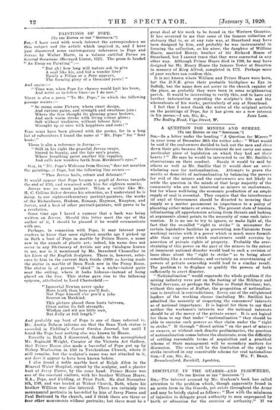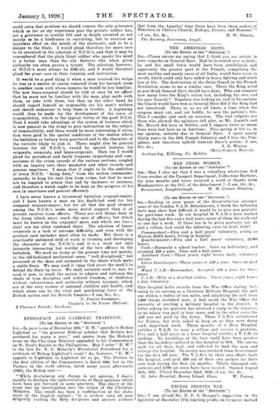DISCIPLINE IN THE GUARDS—AND ELSEWHERE. [To THE EDITOR OF THE
" SPECTATOR."J SIR,—The interest aroused by Mr. Graham's book has called attention to the problem which, though apparently found in an acute form in the Guards, yet exists throughout the Army and may be briefly stated as follows : " How with the minimum of injustice to delegate great authority to men unprepared by birth or education for the exercise of authority." If we
could solve that problem we should remove the only grievance which se far. as my experience goes the private soldier has, yet a grievance so acutely felt and so deeply resented as not merely to be a hindrance to recruiting, but to exercise an injurious effect on the minds of the electorate, and to be a danger to the State. I would plead therefore for more care to be exereised in the selection of N.C.O.'s, and that it may be remembered that the plain blunt soldier who speaks his mind is a better man than the oily flatterer who when given authority too often proves a tyrant. The selection, however, of N.C.O.'s must always be difficult, and I would therefore plead for great care in their training and instruction.
It would be a good thing if when a man received his stripe lie was as a matter of course removed from his barrack room to anothes room with whose inmates he would be less familiar. The new lance-corporal should be told at once by an officer that he must not be familiar with the men, play cards with them, or joke with them, but that on the other hand he should regard himself as responsible for his men's welfare and should endeavour to help them in trouble. A beginning would thus be made for the development of the sense of responsibility, -which is the typical virtue of the good N.C.O. Next I would take advantage of the system of lectures which is now general in the Army to give instruction on the subject of responsibility, and these would be more interesting if atten- tion were paid to the special conditions of the station where the battalion or battery were quartered and to the character of the recruits likely to join it. There might also be general lectures for all N.C.O.'s, varied by special lectures for sergeants, corporals, and lance-corporals. Then too I would plead for periodical and fairly frequent inspections and com- parisons of the crime records of the various sections, coupled with an inquiry into their musketry and other records and general smartness. I mean that it ought to be the ambition of every N.C.O. " doing duty," from the section commander upwards, to keep his unit free from crime, but that he must not be tempted to attain that end by slackness or easiness, and therefore a watch ought to be kept on the progress of his men in smartness and general efficiency.
I have never known a tyrannical battalion sergeant-major, and I have known a man on his death-bed send for his company sergeant-major; but for all that the good element among the N.C.O.'s needs more moral support than it at present receives from officers. There are evil things done in the Army which never reach the ears of officers, but which must be known in the sergeants' mess, and which one fears, alas! are too often condoned there. The selection of lance- corporals is a task of extreme difficulty, and even with the greatest eare mistakes must often he made. But there is a practically unlimited field of work in forming and developing the character of the N.C.O.'s, and it is a work not only intensely interesting but worthy of the best officers in the battalion. We need an Army at the present time not merely, in the old-fashioned mechanical sense, " well disciplined," but possessed of the ideas and animated by the ideals whiCh make a stable-State. We may need it (may God avert the need!) to defend the State by force. We shall certainly need it, nay, we need it now, to teach the nation to admire and embrace the ideals of true discipline and ordered freedom, of obedience
without subservience and authority without tyranny, which are of the very essence of national stability and health, and which alone can be the vital and quickening force of the British nation and the British Empire.—I am, Sir, &c.,
C. POYNTZ Sssesasois,
Chaplain to the Forces (Retired). 3 Clarence Parade, Southsea.











































 Previous page
Previous page